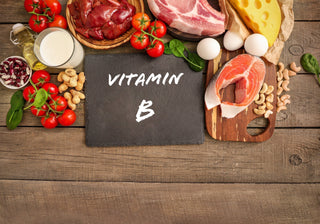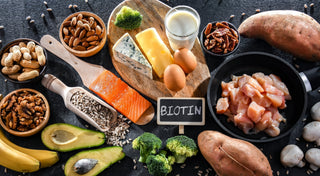What Foods Contain Vitamin B?
When it comes to maintaining energy levels, supporting brain function, and keeping your body running smoothly, the vitamin B foods are true superheroes. But what exactly are they, and where can you find them? Let's dive into the world of a vitamin B food list to help you fuel your body and mind.
Animal-Based Sources
- Eggs: Packed with B2, B7, and small amounts of B12.
- Meat: Beef, chicken, pork, and liver are great sources of B1, B2, B3, B6, and B12.
- Fish: Salmon, tuna, and trout provide abundant B3, B6, and B12.
- Dairy Products: Milk, cheese, and yogurt are high in B2 and B12.
Plant-Based Sources
- Leafy Greens: Spinach and kale are rich in folate (B9).
- Legumes: Lentils, chickpeas, and black beans are excellent for B1, B2, B3, and B9.
- Whole Grains: Brown rice, oats, and whole wheat contain B1, B2, and B3.
- Nuts and Seeds: Almonds, sunflower seeds, and flaxseeds offer B2 and B3.
- Fruits: Bananas, avocados, and oranges are good for B6 and B9.
Fortified Food
For those with dietary restrictions, many foods like cereals, plant-based milks, and nutritional yeast are fortified with B-complex vitamins, especially B12, which is harder to obtain in a vegan diet.
B Vitamins in Foods
Let’s explore in a little more detail the different variants of B vitamins and uncover the foods that are richest in these powerful vitamins.
- Function: Vital for energy production and nerve function.
- Top Foods: Sunflower seeds, pork, whole grains (brown rice, oats).
- Function: Supports energy metabolism and skin health.
- Top Foods: Eggs, dairy products (milk, cheese), almonds.
- Function: Essential for cholesterol regulation and DNA repair.
- Top Foods: Tuna, chicken breast, peanuts.
- Function: Helps synthesize coenzymes and hormones.
- Top Foods: Avocado, mushrooms, sweet potatoes.
- Function: Supports brain development and immune function.
- Top Foods: Bananas, turkey, chickpeas.
- Function: Promotes healthy hair, skin, and nails.
- Top Foods: Eggs, salmon, sweet potatoes.
- Function: Crucial for prenatal health and cell growth.
- Top Foods: Spinach, lentils, oranges.
- Function: Essential for red blood cell production and neurological health.
-
Top Foods: Shellfish (clams, crab), beef liver, fortified cereals.
Should I take B12 or B Complex?

How to Boost Your Vitamin B Intake - The Vitamin B Foods List
Vitamin B plays a vital role in keeping your body energised, your brain sharp, and your mood stable. However, many people struggle to get enough of these essential nutrients from their daily diet. Whether you're looking to improve your vitamin B intake naturally or through fortified foods, this guide provides practical tips to help you make smarter choices for your health. Here is a vitamin B food list.
Meal Suggestions for Vitamin B-Rich Diets
Incorporating high vitamin B foods into your meals doesn't have to be complicated. Here are some easy ideas:
- Breakfast: Start your day with a nutrient-packed breakfast by combining whole-grain toast (B1 and B3), scrambled eggs (B2 and B7), and spinach (B9). For a vegan alternative, opt for fortified cereals paired with almond milk fortified with B12.
- Lunch: Try a lean protein salad with chicken breast (B6 and B3), avocado (B5), and lentils (B9). Drizzle olive oil and lemon for added zest. If you're vegan, substitute tofu or tempeh for the chicken and sprinkle nutritional yeast for a boost of B12.
- Dinner: Enjoy a balanced plate of grilled salmon (B6 and B12), sweet potatoes (B5), and steamed broccoli (B9). Or, for a plant-based dinner, whip up quinoa-stuffed bell peppers and a side of mushrooms sautéed in olive oil.
Snack Ideas to Sneak in Vitamin B
Snacking is a great opportunity to get some extra vitamin B foods without overthinking your meals. Here are some tasty options:
- Boiled Eggs: A quick snack packed with B7 and B2.
- Bananas: A convenient source of B6 on the go.
- Trail Mix: Combine almonds (B2), sunflower seeds (B1), and dried apricots (B9) for a nutrient-dense snack.
- Smoothies: Blend fruits like bananas, spinach, and avocado for a refreshing and vitamin-packed drink.
Fortified Foods and Supplements
Sometimes, getting all your vitamin B nutrients solely from food can be challenging, especially for vegans or individuals with dietary restrictions. Here’s how fortified foods and supplements can help:
- Fortified Cereals and Plant-Based Milks: Many brands offer cereals and milks fortified with B12, a vitamin difficult to find in plant-based diets.
- Nutritional Yeast: Often fortified with B-complex vitamins, it's a tasty sprinkle for soups, pasta, and salads.
- Vitamin B Supplements: For those who need an extra boost, talk to your healthcare provider about a B-complex supplement that covers all eight variants.
Cooking Tips to Preserve Vitamin B
Certain cooking methods can preserve more vitamin B in your food:
- Steaming: Retains nutrients better than boiling.
- Sautéing: Lightly cook vegetables and proteins to maintain vitamin content.
- Minimal Processing: Whole grains, raw nuts, and fresh vegetables are less likely to lose nutrients compared to heavily processed foods.
Signs You Might Be Deficient in Vitamin B
Deficiencies in different B vitamins can present with varying symptoms, so it’s important to understand how each one impacts your health:
Fatigue and Weakness - Related Vitamin: B1 (Thiamine), B2 (Riboflavin), B12 (Cobalamin).
- Why It Happens: B vitamins are crucial for converting food into energy. A deficiency may leave you feeling constantly tired, even after a full night’s sleep.
- What to Do: Incorporate foods like lean meat, dairy products, and fortified cereals into your diet.
Mood Changes and Irritability - Related Vitamin: B6 (Pyridoxine), B12 (Cobalamin), B9 (Folate).
- Why It Happens: These vitamins play a key role in producing neurotransmitters like serotonin, which regulate mood and emotions.
- What to Do: Add bananas, turkey, and leafy greens to your meals.
Nerve Problems - Related Vitamin: B12 (Cobalamin), B1 (Thiamine).
- Why It Happens: Vitamin B12 and B1 help maintain the health of your nervous system. Deficiency can lead to tingling sensations in your hands and feet, numbness, or difficulty walking.
- What to Do: Boost your intake with eggs, shellfish, and fortified plant-based milk if you’re vegan.
Skin, Hair, and Nail Issues - Related Vitamin: B7 (Biotin).
- Why It Happens: Biotin is important for maintaining healthy hair, skin, and nails. A deficiency might lead to hair thinning, brittle nails, or dry skin.
- What to Do: Include foods like eggs, almonds, and sweet potatoes in your diet.
Digestive Problems - Related Vitamin: B3 (Niacin), B12 (Cobalamin).
- Why It Happens: A deficiency in these vitamins can cause nausea, bloating, or even constipation in severe cases.
- What to Do: Try fish like tuna, chicken breast, and yogurt.
Anemia - Related Vitamin: B9 (Folate), B12 (Cobalamin).
- Why It Happens: These vitamins are essential for the production of healthy red blood cells. Without them, you may experience pale skin, fatigue, and shortness of breath.
- What to Do: Lentils, beef liver, and oranges are great options for improving levels.
Vitamin B in Different Diets
Certain groups are more prone to developing vitamin B deficiency:
- Vegans and Vegetarians: B12 is mostly found in animal-based foods, making deficiency common in plant-based diets.
- Pregnant Women: Higher folate (B9) requirements during pregnancy can lead to deficiency without proper supplementation.
- Elderly Individuals: Absorption of B12 decreases with age, putting older adults at higher risk.
- Those with Health Conditions: Digestive disorders like Crohn's disease or celiac disease can hinder B vitamin absorption.
How to Address Vitamin B Deficiency
If you suspect a deficiency, here are some practical steps:
- Adjust Your Diet: Add high-vitamin B foods like eggs, leafy greens, lean meats, and whole grains to your meals.
- Consider Fortified Foods: Look for fortified cereals, plant-based milks, or nutritional yeast to fill gaps.
- Take Supplements: Consult with a healthcare provider about whether a B-complex supplement is right for you.
- Get Tested: If symptoms persist, request a blood test to pinpoint which B vitamin you’re lacking.
Conclusion
Vitamin B deficiency can manifest in ways that impact your daily life, from fatigue and mood swings to nerve problems and anaemia. Recognising the signs and addressing them early can improve your quality of life and protect your long-term health. With a balanced diet and the right nutritional strategies, you can ensure you’re getting enough of these crucial vitamins.
Boosting your vitamin B intake is easier than you might think. By planning meals, choosing smart snacks, and embracing fortified products, you can meet your nutritional needs and feel your best every day. If you’re unsure about specific requirements or supplements, a conversation with your doctor or healthcare professional is always a good step.
Shop: Vitamin B Supplements




